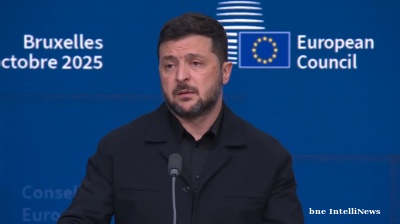The Turkish lira shifted back to overvaluation while a central input into currency valuation and external risk assessment more generally is the current account, the Institute of International Finance (IIF) said on July 14 in a research note.
“In recessions, we usually see shrinking current account deficits via import compression. This time around, synchronised lockdowns have the potential to disrupt exports too,” it recalled.
The IIF uses data on trade in goods, which are available earlier than current accounts, to map out trends in emerging market (EM) external adjustment. Trade is contracting across the board.
With few exceptions, trade balances are improving as imports fall more than exports. The IIF thus expects most EM current account deficits to vanish. This is by no means a reflection of healthy import substitution or export competitiveness. It is the temporary result of collapsing growth and tightening financing conditions.
“Turkey is a notable exception, as it looks to be returning to a sizable current account deficit in the context of a large credit expansion,” it added.

Brazil and Turkey show the least import compression in the IIF’s sample as June data are available for both.
In Turkey, policies to support growth via credit expansion prevent imports from falling as fast as in other countries, but risk wide imbalances in the context of low reserves, it warned.
“$3bn turned over in the Turkish casino yesterday with anne ve baba [mom-and-pop] accounts accounting for most of it. I certainly haven't met any intl investors who want to be lulled into the speculative bubble currently inflating in Turkey,” Julian Rimmer of Investec wrote on July 14 in an emailed note to investors.

“Look, for example at EKGYO's [Emlak REIT] 1H numbers and home sales released today for 1H20. EKGYO performed 10 times better than they guided. When I met the CFO, Mr. Mustafa Buga, back in Feb he said they would do well and none of us present quite believed him,” Rimmer added.
“Home sales in Turkey were 190k in June with mortgage sales +1287% yoy. More than half of those home sales were attributable to mortgages… Although Turkish real-estate appears to be booming, there are pockets of weakness,” he also noted.
“The whole circus is being sustained by the govt and CBT [Turkish central bank] policies but the booming credit expansion, into the biggest recession in living memory, can only end one way. Who knows when?” he warned.
“The state banks are burning reserves to defend the lira and now have short fx positions in excess of 20% of equity which is illegal but the CBT seems remarkably comfortable with that. Meanwhile they fined seven brokerages for short-selling. Un grande spectacle de merde looming,” he concluded.

“If you were in EM, you had to invest/trade in Turkey, and you had to understand, or try to understand, the story. Most EM investors spent a lot of time visiting Turkey, talking and thinking about Turkey… I think [this] is changing a bit,” Tim Ash of Bluebay Asset Management wrote on July 14 in an emailed note to investors.
“As the Erdogan government tries to micro manage markets, it is becoming more difficult to trade and invest in Turkey – at least for foreign portfolio investors,” he added.
“Investors are still hanging back from investing in Turkey – indeed, they continue to reduce exposure to Turkish local markets. Therein the stock of foreigners now in the local debt market is [$7.1bn as of July 3, or at 10% of its $71.8bn peak in 2013], and debt and equity portfolio outflows have continued this year to the tune of over $11bn,” he also wrote.

“What is remarkable about the [outflows this year] also is that this has been in an environment of monetary policy easing which would normally entice hot money inflows from foreign bond investors – indeed in any other year over the past 20 years when policy rates would have collapsed by 1000bps plus I think Turkey might have expected $10bn-20bn in portfolio inflows,” Ash added.
The Turkish central bank's QE asset purchases since March have left it holding TRY89bn ($13bn) as of July 13 in domestic government papers, rocketing up from TRY20bn as of March 25, according to the central bank’s balance sheet.
Some TRY23bn of the bonds it holds are from the unemployment fund, Reuters noted on July 9 in a story entitled “Record stimulus tightens Turkey's grip on markets as foreigners flee”.
The “unprecedented monetary easing”, combined with an asset ratio pushing local banks to buy government bonds, helped drive the share of foreign ownership of Turkish government bonds down to a record low of 4.27% as of July 3.
The central bank’s share in domestic government bonds stood at 7.7% while local banks had 64%.
“The Erdogan administration is pump priming growth through the credit channel aggressively, with 30-50% YOY rates of credit growth, and Turkey seems to be something of an odd one out, or exception, in this global deflation theme,” Ash noted.

“Therein also perhaps locals, given continued dollarisation in terms of local deposits, which remain close to record highs at around the $200bn level. The fact that neither foreign portfolio investors not local retail/corporate depositors want to hold lira is quite telling,” Ash wrote.

“At the heart of the problem is the political economy. And economic policy is Turkey is driven by the political and electoral cycle – and the Erdogan administration is almost always in election mode. It always feels the need to deliver growth to create jobs and the feeling of prosperity to underpin its electoral support,” according to Ash.
“And historically growth has been driven by credit – and lots of it – and most of this has been foreign funded. But what is changing now is the CBRT [Turkish central bank] has figured out the wheeze of funding this credit growth by utilising domestic FX savings in the form of the weight of FX deposits in the banking system,” Ash wrote.
“The CBRT and Turkish policy makers seem to think they can use smoke and mirrors to deceive when it comes to the impossible trinity to deliver a stable currency, high growth and low inflation. Their version of it is the “wheeze” of recycling the large/rising stock of local FX deposits, through state owned banks to defend and anchor the exchange rate, sufficient to allow them to cut policy rates to spur high real GDP growth and a political dividend,” he wrote.
“But while growth might be rebounding, high and sticky inflation is a reflection of the fact that the policy is not really working, and continued dollarization and capital flight by foreign portfolio investors is evidence of this,” according to Ash.
“Evidently neither local deposit holders nor foreign portfolio investors think the carry is enough to compensate for inflation and ultimately exchange rate risks,” he wrote.
“And frankly few people believe that the CBRT has discovered macro nirvana on the impossible trinity through the recycling of FX deposits – whether this is hidden through a technicality of how these swap transactions are recorded on the CBRT balance sheet, the reality is clear to most objective economists that the CBRT is spending other peoples’ money. Those other people are depositors,” according to Ash.
“And it is true that gross reserves are really all that matters from a central bank FX management perspective, or they are all that matters until they don’t – as recent experience in Lebanon reveals,” Ash noted.
“It has to be deeply troubling that while the CBRT has been able to keep headline gross FX reserves more or less unchanged this year, its net position has deteriorated to the tune of anywhere from USD22-50bn, again depending on how swap transactions are accounted for,” he recalled.
“As Lebanon proved, this strategy can last many years, even decades, but when the music stops the FX mismatches have to paid by someone, and in Lebanon’s case it is now mostly being borne by depositors,” Ash warned.
“So inflation is in double digits and sticky, the government continues to pump prime growth, which will feed a larger current account deficit, bringing a larger external financing requirement. This is being masked by the fun and games in the use/accounting of net reserves – it is being funded through spending the FX deposit base. But eventually the music will stop, and something will have to give again, in a repeat of 2018,” he also warned.
“Either the FX will have to adjust weaker, or policy rates will have to go higher to slow domestic demand and import demand with it. It is possible though with foreigners largely out of the market that this CBRT wheeze could last all year, and well through 2021,” he estimated.
Ash guesses the experience from 2018 is that we know the bubble will burst and its better for the CBRT to deflate it slowly through the neck using rates, but because of the political setting and Erdogan’s aversion to interest rates and usury, the balloon is more likely to be overinflated to bursting point, rather than gradually let down. Cleaning up the mess is then a much more difficult affair.
“Net-net, because of all the above foreign investors just don’t feel comfortable investing in the story. They are convinced the bubble will burst, but just do not know when, so would rather stay on the side-lines,” according to Ash.
“The loss of the $30bn tourism business, at least for this year is a real blow. It’s hard to see this business coming back quickly at least for this season. And obviously this puts added pressure on the BOP, and the exchange rate,” he also warned.
“There is always a lot of geopolitical noise in Turkey – we can think here of strained relations with the West over migrants, the situation in the Eastern med, the Gulen issue, the Kurdish issue, …democracy and human rights are under threat from the Erdogan administration, Russia (S400s), Iran sanctions busting (the Halkbank issue) and Syria, amongst others... Relations are also strained with some Gulf states (Saudi Arabia, the UAE) and Egypt over Turkey’s support for political Islam, latterly in Libya. And more recently the warming in relations with Russia has gone into reversal as tensions also emerge over Syria, Libya and now the Hagia Sophia mosque issue also,” he recalled.
“It is probably fair to say that on some levels relations with the US and the EU are the worst they have been in a decade or more. And yet despite all that – and plenty of talk of imminent sanctions being imposed on Turkey by the US for the Halkbank issue and S400s – the West has done little in effect to sanction the Erdogan administration. Some might argue that Erdogan has played the West well, and in particular he has utilised the seemingly strong personal bond between Erdogan and Trump, and the two respective first families, to counter sanctions pressure from the DC establishment,” he noted.
“Similarly, with regards to the EU, Erdogan seems to have read well that the EU needs Turkey more than the other way around on issues such as NATO defence (Turkey still has the second largest standing army in NATO) migrants, Syria, Libya and fighting Islamic terrorism,” he also wrote.
“Perhaps the biggest risk to the above comes from looming US elections,” he warned.
Ash thinks it is not by chance that foreign direct investment is running close to 20 year lows – and he thinks you can chart the decline therein from the peak of 2006/07 when Turkey was on a track to EU membership, and benefitting from a near honey moon in relations with the West, to the period since when relations with the West have been on a trend towards deterioration.

News
Category 5 hurricane Melissa bears down on Jamaica with Haiti and Cuba in storm's path
A catastrophic Category 5 hurricane was bearing down on Jamaica on Monday, October 27 afternoon with sustained winds of up to 282kph (175mph), threatening to become the strongest storm the Caribbean island has ever experienced.
.jpg)
US senator tells Maduro "head to Russia or China" as warships close in on Venezuela
A senior US Republican senator has warned that Venezuelan President Nicolás Maduro's time in power is running out and suggested he leave the country, as military tensions in the Caribbean continue to escalate.

Milei celebrates resounding victory in Argentina's midterm elections
Argentine President Javier Milei scored a major win for his La Libertad Avanza (LLA) party in Argentina's October 26 midterm legislative elections, as the party obtained approximately 40.84% of the nationwide vote with 99.14% of the votes counted.

Zelenskiy accuses China of aiding Russia’s war effort through industrial and military support
Ukrainian President Volodymyr Zelenskiy accused China of materially supporting Russia’s military-industrial complex, providing key technologies and resources that have enabled Moscow to sustain and scale its war effort against Ukraine.




